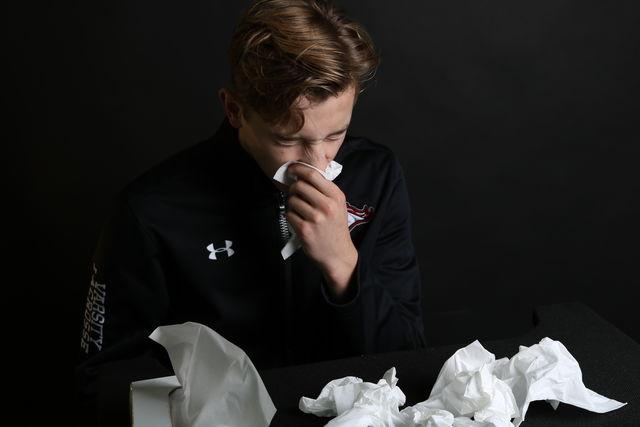Photo illustration by Raymond Link |Brophy student uses several tissues to try to clear his nose.
By Jackson Moran ’21
THE ROUNDUP
Throughout the first semester, reported absences due to sickness rose, likely as a result of ill students continuing to go to school and infecting others.
There have been many pathogens making course through Brophy, including whooping cough and hand, foot and mouth disease, yet infected students often go to school anyways.
Dean of Students, Mr. Patrick Higgins, said that this year, the average amount of missed class periods has gone up due to sickness, based upon data collected from last year and the most current data available this year.
The dean’s office policies stipulate that a student should have no more than six personal absences per semester, and they track students who go beyond those guidelines to see if illness is a factor.
“This year we did break out some data, prior to this meeting, and my perception was that we did have more illness earlier in the semester,” Mr. Higgins said.
These early absences were accentuated by a variety of pathogens passing through campus.
“We had kind of an early flu and then a secondary one, as well as a couple other feature illnesses along the way,” Mr. Higgins said.
He said that the bottom line was that there had been more illnesses up to that point, and that this number was higher than years prior.
This year, the number of absences related to illness are up 24 percent from semester one of the 2017-2018 school year, and 20 percent from the 2016-2017 school year, according to the dean’s office.
The dean’s office has many protocols pertaining to sick days and illness among students.
“If a student is sick, if they are vomiting or have had a fever over 100 [degrees Fahrenheit] for the last 24 hours, they should stay home until that 24 hour cycle has subsided,” Mr. Higgins said.
This is a standard procedure in effect to ensure that symptomatic students do not come to school and infect others.
“Any student who has missed three consecutive days, we typically ask for some documentation for that illness,” he said.
Illness that extends past the six day mark requires documentation, which Mr. Higgins hopes to use to advocate for students who have been sick for an extended period of time.
This year in particular, the common cold and influenza are of the top concern.
“As we enter the cold and flu season, we offer a reminder to families of the importance of preventative health,” said the November 2nd edition of the Brophy Newsletter.
It listed ways for students to remain healthy and prevent the spread of these diseases, as well as what to do if infected.
“Those who are sick with the flu or a severe cold should stay home until their doctor tells them they are no longer contagious,” the newsletter said.
Contagiousness is a slippery slope, however, as many illnesses become contagious before symptoms begin to show, in which case it is dependent on families to know when to keep a student home.
While the common cold and influenza have been the most common cause of student illness this year, according to Mr. Higgins, “anomaly” pathogens have occurred.
One anomaly sickness that recently made the rounds is pertussis.
Pertussis, or whooping cough, which according to the Mayo Clinic, “is a highly contagious respiratory tract infection,” has also spread throughout the classes and even on retreats.
Kairos 162 was also a victim of the whooping cough “outbreak.”
Ethan Ripple ’19 said he got sick from another student on this retreat, but initially thought nothing of it because it had seemed like a cold.
“I would say at least half of us got sick,” Ripple said.
He does not know if it was solely from that encounter or if the group contracted it when they arrived back.
“I was sick for probably two weeks,” Ripple said, “The test to determine if you are positive for pertussis go from zero to two, and a 1.1 means you are positive. I had a reading of 1.1.”
He was required by the dean’s office to be on antibiotics for two days, provide test results to confirm his illness and stay home for quite some time.
Ripple said that staying home definitely definitely disrupted his school-related activities.
“Anyone who goes on a Kairos or Magis understands that you really aren’t supposed to do homework while you’re there, but then I got back and got super sick,” Ripple said.
He said that he fell behind in a few classes, even while doing his work at home.
Ripple, a member of the cross country team, was also unable to run for two weeks, mere weeks before the state championship meet.
Another feature ailment that was noticed this year, the hand, foot and mouth disease has been particularly prevalent at colleges, universities and high schools.
Brophy was not an exception as there were sixteen cases of it reported, about 1% of the student population.
“We had some consistent, but I wouldn’t say extreme, hand, foot and mouth for a period of weeks, that seems to have subsided,” Mr. Higgins said.
According to the Wall Street Journal (WSJ), many colleges, including Johns Hopkins and Princeton, have been fighting the virus, with little success due to its highly infectious nature.
“The disease is easy to pass on because those who are infected may not know it for the first three to six days, since there are no symptoms,” the WSJ said.
“When we have those kinds of feature diseases, those that would not be considered normal or may be more communicable, pertussis in particular, these are typical to childhood diseases, so them featuring themselves in a high school is not normal,” Mr. Higgins said.
He said that when the dean’s office comes across these illnesses, they report it to the Maricopa County Health Department and see what their suggested course of action is.
Michael “Mikey” Stehly ’21 is particularly at risk to common pathogens because of his battle with Crohn’s disease.
Stehly has missed multiple days this year due to illness, and attributes his medication for this.
“It’s an autoimmune disease, meaning my immune system attacks itself and my digestive system,” Stehly said. “Essentially, the medicine I have to take suppresses my immune system, so that makes me more vulnerable to sickness.
Stehly also added that it makes it much harder for sicknesses to go away and said that he had just gotten out of being sick for four weeks because of it.
For him, taking time off meant more work and a much more difficult schedule upon his return.
Mr. Higgins said that he urges families to keep students home when they show symptoms or are contagious, and hopes that students and families can recognize when to stay home.
After an illness, the reacclimation process is often difficult at Brophy, but dean’s office says it is very willing to work with students to make the make-up process easier.
“One of the things we do for students is we get them in touch with our academic support coordinator. If it’s three consecutive absences we always report that to the student’s counselor so they can provide support,” Mr. Higgins said.
He said that the dean’s office acts as a conduit to facilitate for students a less stressful arrival back on campus.
He also mentioned some ways in which the school already provides students a way to either keep pace with instruction, or allow students to more easily make up missed class time.
“Students, when they come back, instead of going on a FLEX, can go and sit in on a class they may have missed earlier in the week,” he said.
Few students actually take advantage of this program, but it is only one of the ways in which the school makes reassimilation after extended illness less painful.




























